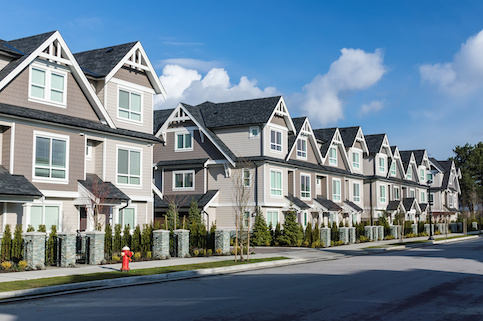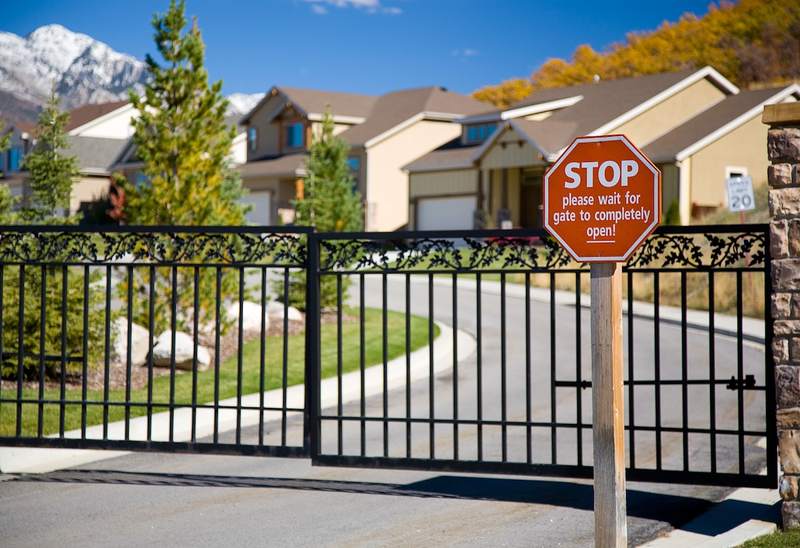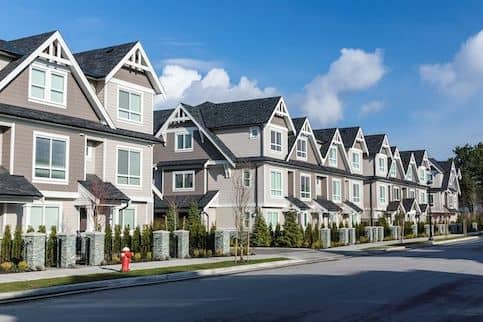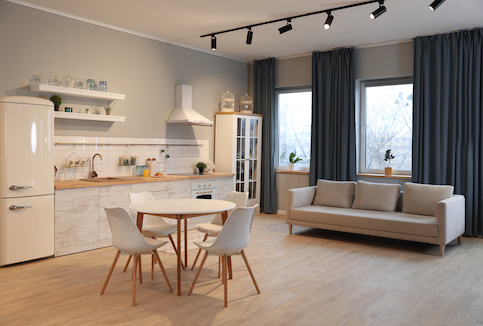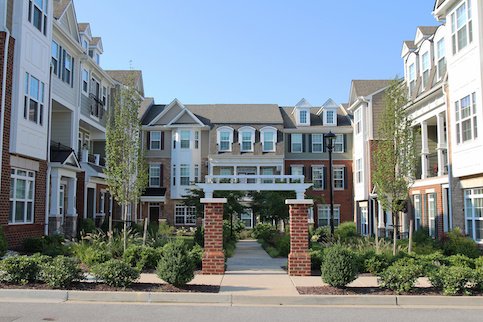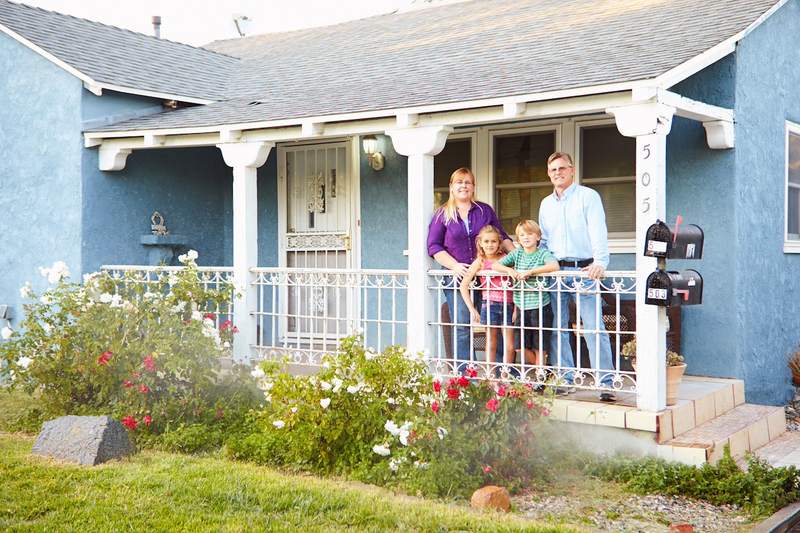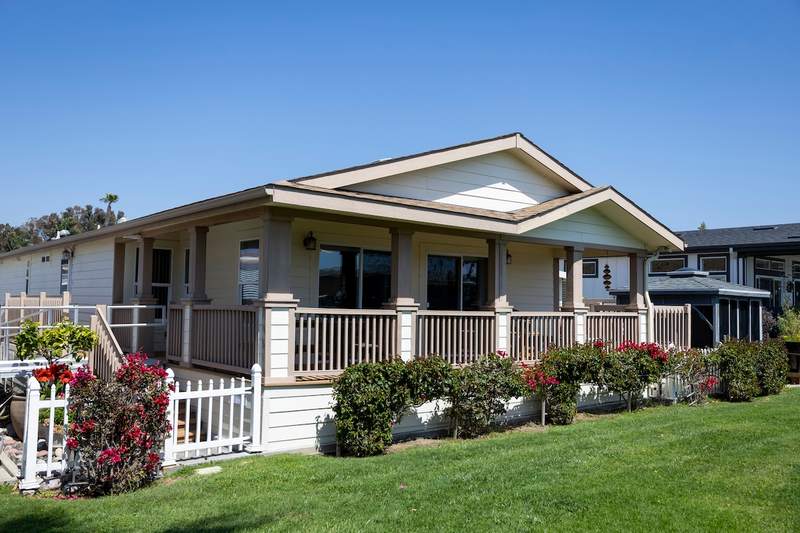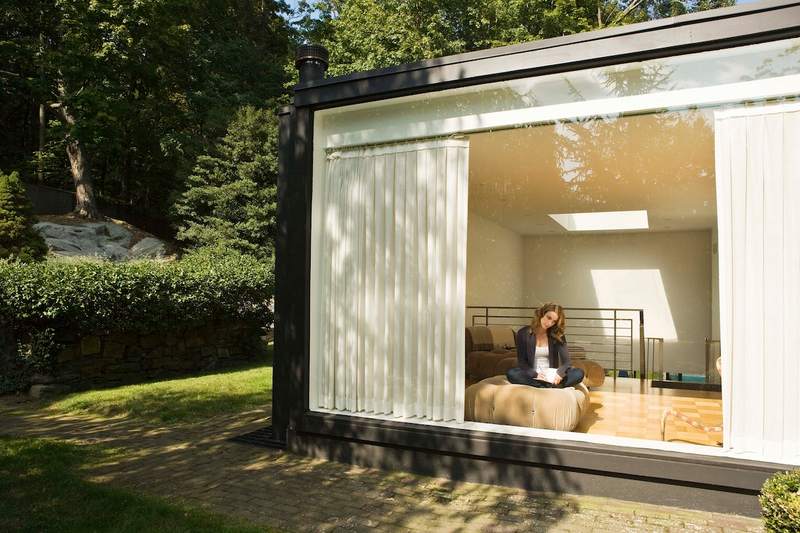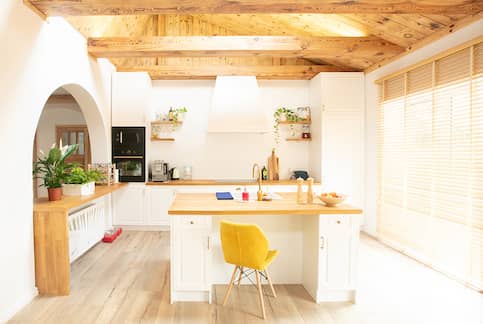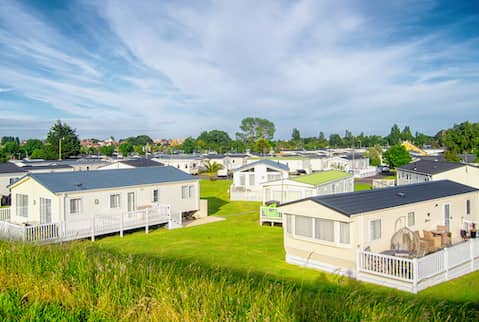Owning a home doesn’t always mean buying a house. For many aspiring homeowners, buying a condominium can be an affordable option that fits their desired lifestyle. Here’s what you need to know about condos and the pros and cons of buying and owning one.
Key Takeaways:
- A condo is a unit you can own within a larger building or complex.
- Owners must pay dues to a homeowners association, which manages the overall building and any common spaces or amenities.
- Condos are often more affordable than townhouses or single-family houses, but they are usually smaller and may have more restrictions.
What Is A Condo And How Do They Work?
A condominium is a building or complex that contains multiple individually owned housing units. Condo buildings usually are similar to apartment buildings, except that instead of a landlord owning the entire building, each living space is individually owned.
Most condo buildings have a homeowners association that manages common spaces and the building exterior. It typically collects dues from the individual owners to pay for these services.
Condo Ownership
When you buy a condo, you own the interior of the unit. Unlike an apartment, where you need the landlord’s permission to make changes, you can do whatever you like to the interior of your unit. You’re also responsible for interior repairs and maintenance.
At the same time, you don’t have to worry about maintaining the exterior, and you can enjoy the building’s common areas and shared services. This may be particularly appealing if you want to own a home but find maintenance and yard upkeep a hassle.
Common Areas And Amenities
A vital feature of a condo is the common areas and shared amenities. This can include everything from a parking garage, rooftop deck and door attendant to a swimming pool, gym and tennis court.
Homeowners Association Fees
Since you own the interior of your unit, you may wonder who’s responsible for the exterior. That’s where the HOA comes in. All homeowners in the building or complex belong to an HOA, which usually is managed by a board of elected members. The HOA collects dues from owners and uses those funds to maintain or repair the exterior of the building or complex, as well as pay for shared amenities such as pool maintenance, landscaping, the door attendant’s salary, etc.
HOA fees vary based on the unit’s size and location, the building’s age and the amenities the building offers. Fees can range from $100 to $1,000 per month but in most cases are in the range of $200 to $300 per month.
Keep in mind that you cannot opt out of HOA fees, so you need to make sure you can afford those fees in addition to your monthly mortgage payment before you buy a condo.
What’s Your Goal?
Buy A Home
Discover mortgage options that fit your unique financial needs.

Refinance
Refinance your mortgage to have more money for what matters.
Tap Into Equity
Use your home’s equity and unlock cash to achieve your goals.
What Are The Different Types Of Condos?
Not all condos are created equal. Here are the most common types.
Condo Home
Condo homes also are known as standard condos. This is a residential property in a building or complex where the buyer owns only the unit’s interior.
Detached Condo
A detached condo has no shared walls with another unit. Detached condos usually are found clustered in planned communities.
Timeshare Condo
A timeshare condo, also known as a condo share, offers a divided form of ownership. Each tenant of a condo share has the right to use the property for a specific time and number of days each year. Timeshare condos are typically used as vacation homes and aren’t considered investment properties.
Private Condo
A private condo is one where the owner rents it out to a tenant – much like an apartment. The rental criteria may differ from other types of apartments in the area.
Condo Building
A condo building refers to a building or complex of individually owned units. Typically, a community property management board or HOA is responsible for the upkeep of the building.
Condo Development
Condo developments are complexes or buildings where the developer owns the land they are built on. The main difference is that the condo owner is responsible for exterior maintenance, with common areas managed by an HOA.
Ready To Become A Homeowner?
Get matched with a lender that can help you find the right mortgage.
Comparing Condos To Other Property Types
If you’re deciding if a condo is right for you, here are some quick comparisons with other types of homes that may help.
Condo Vs. Single-Family House
A single-family house is a freestanding structure, while a condo is part of a building or complex and usually shares a wall with another unit. While condo owners only own the interior of their units, owners of single-family houses own the entire building and the land around it. Single-family houses tend to offer more space than condos but also are usually more expensive. Owners of single-family houses are responsible for maintaining the interior and exterior of their home, as well as the land it sits on.
Condo Vs. Townhouse
A townhouse is a multilevel home that shares at least one wall with an adjacent home. When you own a condo, you own an individual unit, while townhouse owners own the structure of the home and the land it’s built on. Townhouses typically offer a front and back yard, providing more outdoor space than a condo.
Townhouses tend to cost more than condos because they usually have more space and the sale price includes the ownership of the land. Townhouse owners may have to pay HOA fees but often enjoy fewer shared amenities than condo owners.
Condo Vs. Apartment
Condos and apartments look similar and are comparable in size, but you rent an apartment instead of owning it. Renters typically don’t need to repair or maintain the interior or exterior of the building – that’s up to the landlord, who can raise the rent to meet market prices. A significant advantage of owning a condo is the opportunity to build equity as you pay down your mortgage. Condo owners must also pay property taxes, homeowners insurance premiums and HOA fees, and they are responsible for interior repairs and maintenance.
Condo Vs. Co-Op
When you buy a co-op, you buy stock in the company that owns the building, which allows you to occupy one of its units. You own the unit when you buy a condo, but the condo association owns the building. Property taxes usually are rolled into your monthly co-op administration fees if you buy a co-op.
Take The First Step To Buying A Home
Find a lender that will work with your unique financial situation.
The Pros And Cons Of Buying A Condo
Every financial decision comes with advantages and disadvantages. Here’s what you need to know about buying a condo.
Pros Of Buying A Condo
Let’s start with the pros that a condo offers:
- More affordable than single-family houses: Most condos are more affordable than single-family houses in the same area.
- Managed maintenance: Condo ownership relieves some of the maintenance-related stress of homeownership.
- Equity potential: Owning a condo builds equity, which is the difference between what your home is worth and how much you owe on it.
- Access to amenities: Condos often have open layouts, pools, fitness centers and other amenities you may otherwise be unable to afford.
- Community living: Living in close proximity to your neighbors isn’t for everyone, but it can create a feeling of community. Not all condo communities are the same in this regard, so it’s important to find a complex that fits your lifestyle.
- Security: Condo buildings often include a hired security guard and a gated entrance, which can help you feel safer at home.
Cons Of Buying A Condo
Now for the disadvantages of condo living:
- HOA rules: Abiding by the rules and regulations of an HOA can be a problem for some homeowners. A condo might not be the best choice if you want more control over your property.
- HOA fees: These fees provide value by covering items like maintenance and lawn care, but they can range from a couple hundred dollars to more than a thousand dollars monthly.
- Less privacy: Expect to be in close proximity to your neighbors. The close quarters lead to less privacy.
- Less space: Condos can be considerably smaller than single-family houses and usually have limited outdoor space.
- Financing difficulties: It’s often more challenging to finance a condo than a single-family house. That’s because more factors are in play. For example, FHA-approved condos come with higher restrictions from the Federal Housing Administration that help ensure these properties will retain or increase their value.
- Resale difficulties: Selling a condo can sometimes be more difficult than selling a traditional house. For example, a condo can be less attractive to potential buyers due to specific HOA regulations, and it can affect the type of loan a buyer can qualify for.
FAQ
Here are answers to some common questions about condos.
The Bottom Line
Buying a condo can be an affordable path to owning a home and building equity. It also can fit your lifestyle, offering amenities and reduced responsibility for maintenance in exchange for monthly HOA fees. It’s essential to consider the costs and restrictions of condo living before deciding if buying one is right for you.
More From Quicken Loans:
Miranda Crace contributed to the reporting of this article.

Rory Arnold
Rory Arnold is a Los Angeles-based writer who has contributed to a variety of publications, including Quicken Loans, LowerMyBills, Ranker, Earth.com and JerseyDigs. He has also been quoted in The Atlantic. Rory received his Bachelor of Science in Media, Culture and Communication from New York University. He also completed the SoFi/Coursera Fundamentals of Personal Finance Specialization consisting of five courses: Introduction to Personal Finance, Saving Money for the Future, Managing Debt, Fundamentals of Investing, and Risk Management in Personal Finance.
